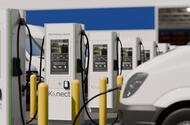Office Infrastructure Vital for Supporting EV Demand and Controlling Costs

Introduction
Two of the world’s leading EV charging companies are focusing on simplifying installations, increasing uptime, and improving cost control to address the rising prices associated with owning electric vehicles. This is particularly important for company car drivers who are facing reduced mileage rates and increasing home energy costs.
The Importance of Fleets in the UK’s EV Market
Fleets play a crucial role in the UK’s plug-in hybrid (PHEV) and electric vehicle (EV) markets, accounting for over 80% of new PHEV and EV registrations in 2023.
The Challenge of Charging Costs
Charging costs remain a significant challenge for EV owners, especially with HMRC’s per-mile reimbursement rates not keeping up with fluctuating energy prices. While petrol and diesel reimbursement rates are based on engine size, there is only one Advisory Electric Rate (AER) for EVs. The AER was recently reduced from 8p to 7p, just before Ofgem’s new home energy price cap increased the cost of electricity by almost 10% to 24.5p per kWh.
According to Zap-Map’s data, public charging can cost up to 80p per kWh, which is more than three times the AER. To break even, drivers using an Ofgem-capped flat-rate tariff would need to average 3.5 miles per kWh, including the energy lost during charging.
The Role of Workplace Charging
Deepesh Nayanar, head of global fleet e-mobility at Konect, believes that workplace charging can help fleets manage costs while supporting company car drivers. However, installations remain challenging.
Konect offers a comprehensive charging solution for electric car fleets, including consultation, project management, in-life maintenance, and integration with on-site energy systems. This turn-key approach simplifies the process for businesses and ensures the uptime of charge points.
The Benefits of Workplace Charging
Despite a 22% drop since 2019, commuting and business journeys still account for a significant portion of vehicles’ average annual mileage in 2023. Employers can provide free workplace charging without taxing the energy as a benefit-in-kind, even for privately owned EVs used for non-business purposes.
Nayanar emphasizes the importance of well-managed workplace charging for employee morale and confidence in the transition to electrification.
Siemens’ Depot360 Solution
Siemens’ Depot360 product focuses on LCV and HGV fleets, offering a monthly fee-based service that includes the design, installation, and management of workplace chargers. This eliminates the need for upfront investment and simplifies the process for businesses.
Bernard Magee, Siemens’ managing director of e-mobility, highlights the benefits of on-site charging infrastructure for reducing emissions, attracting customers, and encouraging employees to switch to EVs.
Conclusion
Building out EV charging infrastructure can be complex, but it is essential for supporting the growing demand for electric vehicles. Simplifying installations, increasing uptime, and controlling costs through workplace charging solutions can help businesses and fleets embrace electrification with confidence.

